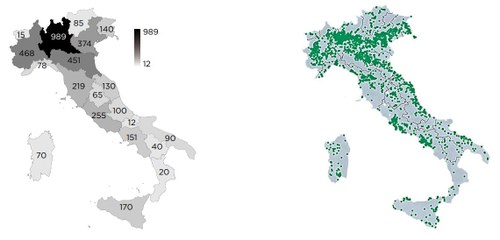Our story
In 2016 our research team on Sustainability Transition Management launched the Sustainability Measurement and Management Laboratory (SuMM Lab) which aims to explore the disclosure level of sustainability-related practices of small, medium, and large Italian organizations (Longo and Mura, 2017).
The project was launched by Mariolina Longo and Matteo Mura with the funding provided by five large Italian companies. By analyzing 712 articles published from 1991 to 2017 on sustainability measurement (Mura et al., 2018), a final list of 69 sustainability KPIs was identified, representing the following 11 thematic areas of sustainability practices: environmental certifications, social certifications, energy, water, waste management, environmental impact, corporate social responsibility, supply chain, consumption, product innovation, and business model. Organizations within the sample were selected by stratifying the whole population of Italian companies by revenues and region.

Report 1: Framework Development and Dataset Construction
This process led to the creation of a structured database containing 3,928 companies located in all Italian regions, with different sizes and operating in 32 different sectors. Data on sustainability-related practices were collected manually through secondary sources (i.e., organization’s websites and sustainability reports published online) in two rounds (2017–2018 and 2019–2020), with the support of a pool of 80 students of the Management Engineering course from the University of Bologna. SuMM Lab aims to overcome some limitations of the academic literature and existing international sustainability frameworks by developing a new measurement framework that is adapted to apply to both LEs and SMEs, and considering disclosure channels such as websites and journals in addition to annual reports.
It also provides information on the contents of sustainability information disclosed by companies and possible drivers for their disclosure, which can represent the baseline for future roadmaps, helping organizations to cope with sustainable development and organizational processes. At the same time, the creation of an innovative database on companies’ sustainability-related practices could be an opportunity for businesses and policy makers to understand contents and drivers of online sustainability disclosure.
This could be a first step toward the planning of policies for industrial transition and the decarbonization of the economy, in line with the key characteristics of sustainable transition (Hansen and Coenen, 2015), and would constitute a fundamental knowledge base for the formulation of informed decisions and specific policies at local, national, and international level, as well as a tool for assessing their effectiveness.

Erbario e Orto Botanico – Bologna
The SuMM Lab acts as a potential permanent observatory aiming to explore the disclosure level of sustainability-related practices of both small, medium and large organisations through a structured database which contains online environmental and social sustainability-related data of companies coming from different industries. To pursue this macro-objective, the project has five specific objectives:
O1. To map the main thematic areas on sustainability measurement;
O2. To provide a comprehensive and integrated framework of key performance indicators by means of which assessing and mapping sustainability practices of companies in a standardized form;
O3. To identify the main determinants of sustainability reporting by companies;
O4. To involve both Italian and EU-based companies;
O5. To disseminate the results achieved to policy makers, the business community, and the civil society.